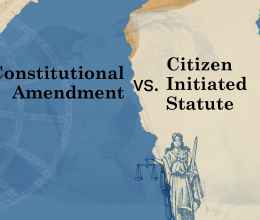HB 365 provides for indefinite prison terms for first or second degree felonies and specified third degree felonies, with presumptive release of individuals sentenced to one of these terms at the end of the minimum term. HB 365 also allows the Ohio Department of Rehabilitation and Correction (“Ohio DRC”) to reduce the minimum term for exceptional conduct or adjustment to incarceration, and allows the Ohio DRC, after it makes specified findings, to a prisoner’s rebut release presumption and keep the person in prison up to the maximum term. HB 365 requires the Ohio DRC to establish a re-entry program for all people released from prison who it intends to have reside in a halfway house or similar facility, but who are not accepted by any such facility. Further, the bill requires the Adult Parole Authority to establish maximum work-load and case-load standards for its parole and field officers and have enough trained officers to comply with the standards. HB 365 proposes the requirement of GPS monitoring for individuals released from prison with specific restrictions, including inclusionary zones and necessary exclusionary zones. The Ohio DRC will be in charge of establishing system requirements for GPS monitoring, and the monitoring will occur either by Ohio DRC or a third-party contract administrator. HB 365 requires the Ohio DRC to operate a statewide database for law enforcement use containing specific information, and to require that third-party administrators for GPS monitoring under a new contract with the Ohio DRC to provide and use a law enforcement accessible crime scene correlation program.
Jurisdiction/Legislation Level
State
LCS Legislation Status
https://www.legislature.ohio.gov/legislation/legislation-status?id=GA132...
Our Take on This Bill
The ACLU of Ohio supports the indeterminate sentencing provisions of the bill, as it could benefit Ohio with regard to its severely overcrowded prisons, a decades-old problem. However, the effectiveness of indeterminate sentencing and many other provisions of this bill depend upon the actions taken by agencies that have wide discretion to implement some of these rules and practices. The Ohio Department of Rehabilitation and Correction (“Ohio DRC”) will be responsible for rebutting or not rebutting presumptive release dates, creating and managing a brand new database, establishing and operating additional reentry sites, determining whether or how to expand in-prison programming, and setting the security classification of incarcerated persons which can determine eligibility for presumptive release. The ACLU believes that while providing the Ohio DRC some discretion could be beneficial for Ohioans, the legislature should implement safeguards to ensure the system is operating properly. This could come in the form of required data collection and reporting by Ohio DRC, with oversight by an outside body such as the Sentencing Commission, the Corrections Institution Inspection Committee, or another appropriate committee.
The ACLU urges lawmakers to consider the costs that the bill’s reforms entail and adequately fund such reforms. In addition to the required database and reentry program costs, HB 365 will increase GPS monitoring for those that are on parole. The bill remains silent as to whether there will be a sufficient number of GPS devices for those who will be paroled, and what happens if a device is not available when they are ready for release. Those in pretrial proceedings may spend additional time in jail as well. Without proper funding and estimates for adequate GPS devices, individuals may unnecessarily spend more time in prison when they could be paroled.
Finally, the ACLU of Ohio urges the Ohio General Assembly to track the effects of the changes made under HB 365, examining how it is working and what additional fixed need to be made. This effort should include changing how prosecutors charge defendants, how judges are sentencing, and whether or not HB 365 is having any positive or negative effects with regard to factors such as race, class, and geography. If the data collection unveils disparities, stakeholders should advocate for further change so Ohioans are not left behind for reasons beyond their control, as we often see it in our current system. The ACLU of Ohio feels the scope of changes proposed by HB 365 necessitate such oversight.
Bill Status
Introduced in House on 10/2/17
Referred to the House Criminal Justice Committee on 10/10/17
Received Committee hearings on 10/17/17, 11/1/17, 11/28/17, and 12/12/17.
Committees
Criminal Justice (H)








